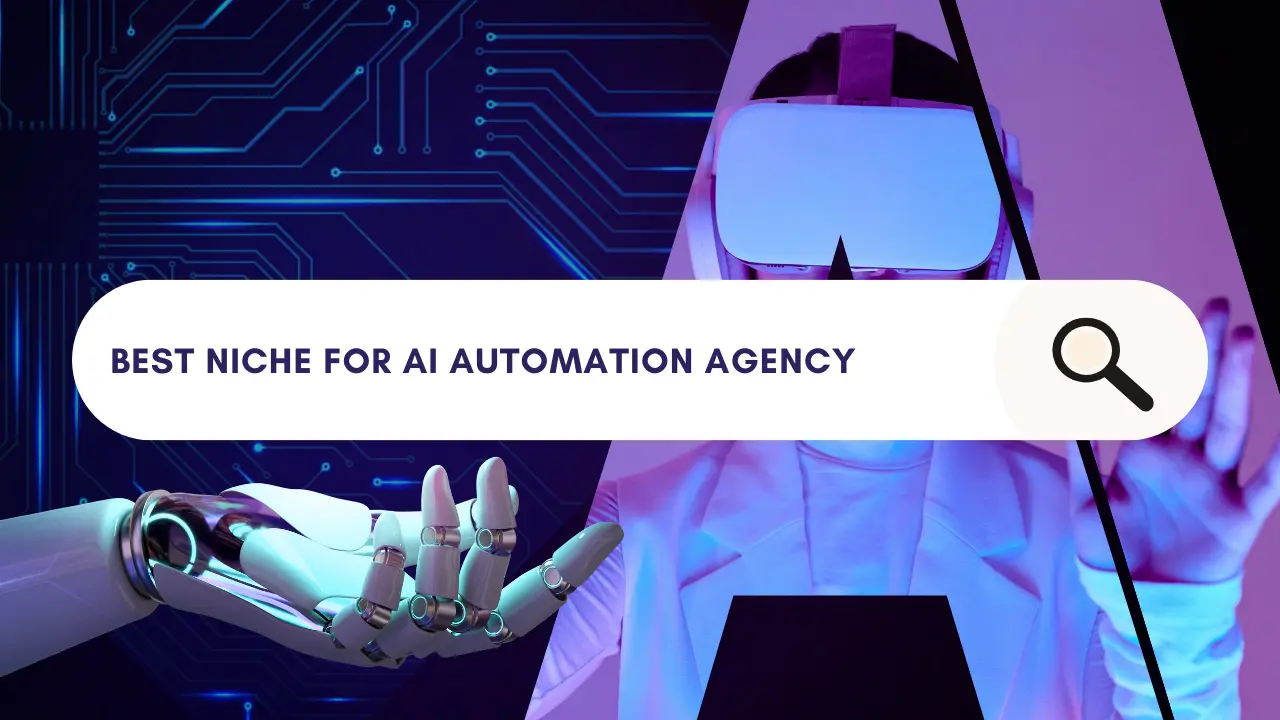Top 10 Profitable AI-Automation Niches are that bring you high margins without doing much hard work and require minimum manpower. The success of your AI automation agency will depend on several factors, including your expertise, the demand for services, your ability to deliver results, and most importantly selection of the best niche.
Table of Contents
Automation using AI and its advantages for agencies increased requirement for services related to AI automation and how critical it is for an AI Automation Agency to select the correct niche
Top Ten AI Automation Niches for Agencies
- Financial Services Automation
- E-commerce Optimization
- Healthcare Automation
- Manufacturing and Supply Chain Optimization
- Marketing and Advertising Automation
- Customer Relationship Management (CRM)
- Smart Cities and Infrastructure
- Legal Tech Solutions
- Human Resources Automation
- Education Technology (EdTech)
How to Choose the Right AI Automation Niches for Your Agency
- Take into account your intended audience
- Examine your qualifications and background
- Do market research.
- Establish objectives
What are the most profitable niches for AI automation agency business?
In the rapidly evolving landscape of technology and business, AI automation has emerged as a transformative force, revolutionizing industries and unlocking new opportunities for innovation and growth. For entrepreneurs looking to capitalize on the burgeoning demand for AI-driven solutions, identifying the most profitable niches is essential. In this post, we’ll explore the top 10 most profitable AI automation agency business niches, along with their scopes, estimated earnings, and pros and cons.
1. Financial Services Automation
Scope: Offering AI solutions to financial institutions for streamlining processes, detecting fraud, and enhancing customer service.
Estimated Earnings: Implementation fees ranging from $50,000 to $500,000+, with monthly subscription fees of $5,000 to $50,000+.
Pros: High transaction volume, willingness to invest in technology, diverse range of services.
Cons: Complex regulatory environment, stiff competition, long sales cycles.
2. E-commerce Optimization
Scope: Providing AI solutions to e-commerce businesses for personalized product recommendations, inventory management, and customer service automation.
Estimated Earnings: Implementation fees ranging from $20,000 to $200,000+, with monthly subscription fees of $2,000 to $20,000+.
Pros: Rapidly growing market, high demand for AI-driven solutions, opportunities for scalability.
Cons: Intense competition, margin pressure, evolving consumer preferences.
3. Healthcare Automation
Scope: Developing AI solutions for healthcare providers to improve patient care, streamline operations, and reduce costs.
Estimated Earnings: Implementation fees ranging from $50,000 to $500,000+, with monthly subscription fees of $5,000 to $50,000+.
Pros: Growing demand for digital healthcare solutions, opportunity to make a meaningful impact on patient outcomes, regulatory support for innovation.
Cons: Data privacy concerns, complex integration requirements, longer sales cycles.
4. Manufacturing and Supply Chain Optimization
Scope: Offering AI-driven solutions for optimizing production processes, inventory management, and supply chain logistics.
Estimated Earnings: Implementation fees ranging from $30,000 to $300,000+, with monthly subscription fees of $3,000 to $30,000+.
Pros: Opportunities for cost savings and efficiency gains, increasing adoption of Industry 4.0 technologies, global market potential.
Cons: Integration challenges with legacy systems, resistance to change, reliance on external factors such as global supply chain disruptions.
5. Marketing and Advertising Automation
Scope: Providing AI solutions for targeted advertising, personalized marketing campaigns, and customer engagement analytics.
Estimated Earnings: Implementation fees ranging from $10,000 to $100,000+, with monthly subscription fees of $1,000 to $10,000+.
Pros: Growing demand for data-driven marketing solutions, opportunities for innovation in ad tech, scalability of digital marketing campaigns.
Cons: Intense competition from established players, evolving regulatory landscape, concerns about data privacy and consumer trust.
6. Customer Relationship Management (CRM)
Scope: Developing AI-powered CRM solutions for automating lead scoring, customer segmentation, and personalized marketing.
Estimated Earnings: Implementation fees ranging from $20,000 to $200,000+, with monthly subscription fees of $2,000 to $20,000+.
Pros: Strong demand for CRM solutions across industries, opportunity to deliver personalized customer experiences, recurring revenue streams.
Cons: Competition from established CRM vendors, integration challenges with existing systems, longer sales cycles.
7. Smart Cities and Infrastructure
Scope: Providing AI solutions for optimizing urban planning, traffic management, energy usage, and public safety in smart city initiatives.
Estimated Earnings: Project-based fees ranging from $100,000 to $1,000,000+, with monthly subscription fees of $10,000 to $100,000+ for ongoing support.
Pros: Government support for smart city initiatives, opportunities for large-scale projects, potential for long-term partnerships.
Cons: Complex stakeholder engagement, regulatory hurdles, longer sales cycles due to public procurement processes.
8. Legal Tech Solutions
Scope: Developing AI applications for legal research, contract analysis, and document automation in the legal industry.
Estimated Earnings: Implementation fees ranging from $20,000 to $200,000+, with monthly subscription fees of $2,000 to $20,000+.
Pros: Growing demand for legal tech solutions, opportunity to streamline legal processes, potential for recurring revenue from law firms and corporate clients.
Cons: Regulatory constraints, concerns about data privacy and confidentiality, longer sales cycles in the legal industry.
9. Human Resources Automation
Scope: Offering AI solutions for automating recruitment, employee performance evaluation, and workforce scheduling.
Estimated Earnings: Implementation fees ranging from $10,000 to $100,000+, with monthly subscription fees of $1,000 to $10,000+.
Pros: Increasing adoption of HR tech solutions, opportunity to streamline HR processes, potential for recurring revenue from businesses of all sizes.
Cons: Integration challenges with HRIS systems, concerns about algorithmic bias in hiring and performance evaluation, longer sales cycles in the HR industry.
10. Education Technology (EdTech)
Scope: Developing AI-powered educational tools and platforms for personalized learning, adaptive assessments, and intelligent tutoring systems.
Estimated Earnings: Implementation fees ranging from $20,000 to $200,000+, with monthly subscription fees of $2,000 to $20,000+.
Pros: Growing demand for digital learning solutions, opportunity to improve educational outcomes, potential for partnerships with schools, universities, and edtech companies.
Cons: Resistance to change in traditional education systems, concerns about data privacy and student well-being, longer sales cycles in the education industry.
Check this article about How To Start An AI Automation Agency. Learn how you can start your own AI Automation Agency.
In conclusion, the AI automation landscape offers lucrative opportunities for entrepreneurs across various industries. By identifying the most profitable niches and delivering innovative solutions tailored to client needs, AI automation agencies can drive growth, create value, and make a meaningful impact on the future of business and technology.



